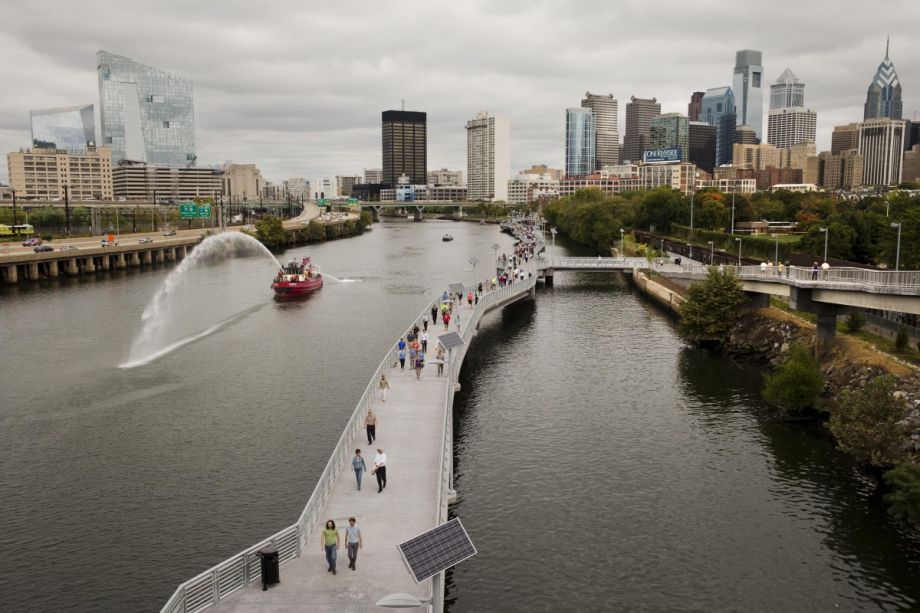Philadelphia City Council passed legislation last week that would provide water bill collections protections for the city’s low-income residents. It would create income-based payment plans, and establish an assistance program to connect homeowners to housing counselors. The bill passed unanimously.
This measure was drawn with anti-vacancy strategy in mind. The protections are intended to safeguard low-income residents from home foreclosure over unpaid water bills. While the repercussions of the mortgage foreclosure crisis are commonly explored, less researched are the impacts of tax lien foreclosures. It’s commonplace for local governments to file a tax lien for an overdue utility bill, and every state allows its municipalities to sell unredeemed tax liens. (The City of Philadelphia is holding an auction this week on more than 900 tax liens.) This legislation, in this sense, is another step in the city’s tax delinquency cleanup efforts.
Affordability plans for water services can be found in multiple cities, like Chicago, St. Louis and Cleveland. In some states, lawmakers have implemented similar, but not identical, protections, largely in response to news stories on tax lien sales. Since 2007, all taxing authorities in Rhode Island have been required to notify Rhode Island Housing of intended lien sales, after the eviction of an 81-year-old woman, stemming from a $474 sewage bill, not long before Christmas. Last year, D.C. passed a law that precludes the sale of liens under $2,500. Maryland’s legislature restricted Baltimore from pursuing tax lien sales under $750 this past April. The twin purposes behind Philly’s new water bill collections protections reflect how cities are re-approaching these issues, as well as a heightened awareness after Detroit’s mass water shutoffs and foreclosures.
Philadelphia City Councilwoman Maria Quinones-Sanchez, one of the bill’s sponsors, says that she realized the need for a water affordability measure sometime around 2009, when she came across data on the city’s water debt. She saw that, of the total at that time, her constituents owed 20 percent, despite only representing 10 percent of the population.
“This becomes potentially the last straw for [a resident] to say, ‘I got to walk out of this house, because I’m never going to get out from under water,’ pardon the pun,” Quinones-Sanchez explains. “You can really destabilize neighborhoods if [collections] is the only thing you’re looking at.”
As the city government turned its focus to land vacancy and tax delinquency in light of the economic downturn, the councilwoman explains that the opportunity to reform property tax collections appeared first, but water was an obvious stripe to that same work.
“We had several different tracks around what I like to call, ‘How do I keep poor people in their homes,’” says Quinones-Sanchez, who is a leading voice on anti-blight tactics among city lawmakers and the author of Philadelphia’s land bank bill. “When we move someone out of their house, when we put their house up for sheriff’s sale, we’re displacing them, and then we’re causing a burden on another system that is ours.” (According to the Philadelphia Inquirer, Quinones-Sanchez was opposed to this week’s tax lien sale.)
There are multiple figures floating around for the sum of unpaid property tax debt in Philadelphia. According to National Tax Lien Association Executive Director Brad Westover, the range is $600 million to $900 million, with interest and penalties likely tipping the number past the billion mark. Philadelphia Water Department data shows that liens for water, sewer and stormwater bills totaled $255 million by the end of the 2014 fiscal year, nearly $40 million more than the year prior.
The NTLA estimates that there are $11.8 billion in delinquent property taxes annually across the U.S. As a 2012 National Consumer Law Center report notes, tax lien foreclosures are often concentrated in black and Latino communities, and pose elevated risks to elderly and disabled residents. Former NTLA Executive Director Howard Liggett expressed concerns to the Washington Post over insufficient protections as the tax lien market has expanded in the Internet age. The NCLC report also detailed that while “banks currently provide interest on savings accounts at less than 1 percent, many states permit tax sale purchasers to recover interest at rates of 18 percent or more, even as high as 20–50 percent.” Plus, the report points out, “[a] tax lien almost always has first priority over all other liens, including mortgages.”
“It ties up properties in limbo. It encourages, I believe, abandonment. It can be very destructive in terms of neighborhoods and increasing blight,” says Alan Mallach, a senior fellow at the Center for Community Progress. “This, I suspect, is a bigger issue, especially when it comes to some neighborhoods, than mortgage foreclosures.”
Mary Grant, a researcher at Food and Water Watch, says preventing home foreclosure over unpaid water bills is a best practice all local governments should consider: “Cities don’t have to send water and sewer debt over to the tax roll. That’s a policy that cities opt into doing.”
Efforts to improve finances, says Grant, shouldn’t focus on struggling residents when there are better alternatives. “A city water utility needs to look at its rate structure in order to see that costs are allocated equitably. [Many cities have] a declining block rate structure, so industrial users and commercial accounts are actually paying a lower rate, because they use larger volume than what households are paying. To address that would be one way to raise additional revenue.”
Prohibiting water shutoffs for low-income homeowners and renters is another best practice, says Grant. While water shutoffs in Detroit spurred a public outcry, she points out, several other cities are cutting off water by the thousands. Buzzfeed culled some numbers on this back in April: “Los Angeles, Houston, Philadelphia and San Diego shut off between 14,000 (Los Angeles) and 26,000 (San Diego) properties last year.”
The new Philadelphia bill does not bar termination of water service for the city’s poorest residents completely. It does allow for assistance program enrollees to recalculate their payments at any time, so the legislation’s capacity to save residents in deep poverty from shutoffs will be defined as the city develops pricing formulas in the coming months.
Quinones-Sanchez’s office examined water affordability programs around the country while working on the legislation. They found a pattern of increased collections after implementation. In other words, if people have the option of paying what they can, fewer will skip payments.
“That’s what you want. You want an efficient system. You want us to spend less time in collections and more time in infrastructure,” says Quinones-Sanchez. Attention can hopefully shift, she adds, from revenue to public safety. “We believe this gets at both.”
The Works is made possible with the support of the Surdna Foundation.

Cassie Owens is a regular contributor to Next City. Her writing has also appeared at CNN.com, Philadelphia City Paper and other publications.
Follow Cassie .(JavaScript must be enabled to view this email address)

















